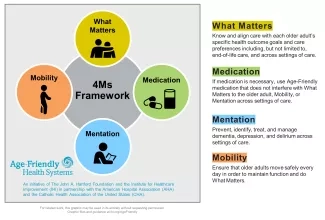Why It Matters

Photo by Equabal Hassan CC BY-SA 4.0 via Wikimedia Commons
“I take care of old people as well. I’m pretty much a geriatrician.”
Like many physicians who specialize in geriatrics, Khai Nguyen, MD, the Clinical Services Chief of Senior Medicine at UC San Diego Health, has heard this kind of comment more than once from other clinicians.
“I appreciate that sentiment,” Nguyen said, “but I also feel that it’s not entirely accurate.”
Though a lack of awareness about the finer points of geriatric medicine can be frustrating, Nguyen believes that getting involved with Age-Friendly Health Systems (AFHS) has helped him approach his passion for caring for adults — and to talk about it — in a whole new way.
AFHS is an initiative of The John A. Hartford Foundation and the Institute for Healthcare Improvement, in partnership with the American Hospital Association and the Catholic Health Association of the United States.
In Age-Friendly Health Systems, age-friendly care is defined by the “4Ms”: What Matters, Medication, Mentation, and Mobility (see Figure 1).

“The 4Ms framework and the age-friendly movement gave me a voice as a geriatrician,” Nguyen said.
He was first introduced to AFHS in 2018 at an American Geriatrics Society meeting. UC San Diego joined an Action Community, a network of teams from different health systems that come together to accelerate their adoption of the 4Ms.
Joining this network and learning about the 4Ms was a game-changer for Nguyen and his team. “It changed the way I communicated,” he said.
Now, he could explain that “what we do is take care of older adults by focusing on the 4Ms framework. That ends up leading to age-friendly care.”
This new clarity also gave Nguyen a new confidence to ask for what he needed from leadership. “Geriatrics traditionally has not been very good at marketing itself,” he said. “When we advocate for ourselves, we’re really advocating for our patients.” He finds sharing stories about people to be a particularly effective way to make his case.
Nguyen’s advocacy has yielded results. The health system created an executive steering committee on age-friendly care to improve care system-wide. He and his division chief were able to secure additional funding to hire a Geriatrics Quality Improvement Medical Director as well as another full-time equivalent position for a geriatrician to help promote age-friendly care on the inpatient services.
Nguyen is also pursuing an initiative to improve older adult health literacy. He recently received a grant from the foundation started by American author Theodor Seuss Geisel who wrote under the pen name Dr. Seuss. The mission of the Dr. Seuss Foundation is to promote literacy and learning, and part of the funding UC San Diego Health received will go toward creating a pamphlet or workbook, informed by the 4Ms, to help older adults achieve their own individual age-friendly care. They will be “not just passive participants,” said Nguyen, but “armed with guidance.”
Another part of the funding will go toward placing Dr. Seuss’s “whimsical, joyful images” on the walls. The goal, Nguyen said, is “to inspire age-friendly care in a way that only Dr. Seuss can.”
Nguyen points out that Dr. Seuss’s picture book for adults, You’re Only Old Once, focused not on children but on an elderly man’s experience with a series of health care encounters. “When I show people this book,” he said, “the first thing they do is smile.”
Though it is humorous, the book was inspired by Geisel’s experiences when he was treated for cancer. What it reveals, said Nguyen, is that “Dr. Seuss did not get age-friendly care. What mattered to him wasn’t asked about.” Nguyen and his colleagues are committed to making sure that their patients cannot say the same.
You may also be interested in:
Age-Friendly resources and toolkits, including the "What Matters” to Older Adults? toolkit and the Age-Friendly ROI calculator
